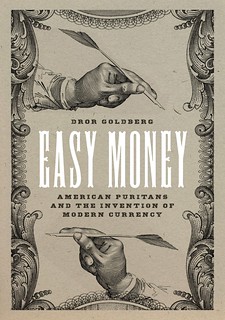
PREV ARTICLE
NEXT ARTICLE
FULL ISSUE
PREV FULL ISSUE
INTERVIEW: EASY MONEY AUTHOR DROR GOLDBERGFor background on the importance of colonial paper money to the developing national economy, the University of Chicago Press published a blog article interviewing Dror Goldberg, author of Easy Money: American Puritans and Invention of Modern Currency. Here's an excerpt - see the complete article online. -Editor
Later, I was surprised to learn how valuable my perspective could be, exactly because I was such a complete outsider. The subject of my investigation—a currency issued by Massachusetts in 1690—has been known to historians for centuries. The perspective of an economist (with legal training) was necessary to appreciate the global historical significance of this invention. This culturally distanced perspective allowed me to investigate and explore this history with fewer preconceived notions about England vs. America, a preference for a region within America or a Christian denomination, or a penchant for seeing everything as leading to the American Revolution. Why is it that the money we use, and the political mechanism that controls it, are so similar to those of 1690 Massachusetts? Massachusetts created an alternative to metallic money and metal-backed paper money. This alternative fit wartime episodes as in 1690 and was implemented during many wars since then, as in the Civil War. To prevent inflation, this legal tender money was regularly abandoned after wars in favor of gold. The World Wars of the twentieth century, with the Great Depression in the middle and the welfare state later, increased government expenditures so much that gold was doomed. Since 1971 gold has played no role in the monetary system. The English colonies and the later United States have struggled for centuries with the proper way to control the money supply. In 1690 Massachusetts it was obvious that a committee should issue the new money because everything of importance was performed by committees. The monetary committee had a slight majority of members representing the executive and legislature over those representing the private sector. These checks and balances worked well, but the later United States forgot this successful experiment in the three times it established a central bank. The First and Second Banks of the United States were private and centralized while the original Federal Reserve System was mostly private and very decentralized. All three experiments were terminated within two decades. The Federal Reserve still exists but in a modified form, in which policy resides in a Federal Open Market Committee, where, as in 1690, the representatives of the executive and legislature have a slight majority over the private sector. This political mechanism has survived for almost a century because it gave the private sector the proper role that the American constitutional tradition has generally granted it. What do you hope most readers will take away from your book? The Puritans were no cartoon characters of stern, disciplined fanatics—they were real people, who tried, with as many moral errors as other humans, to deal with the difficult circumstances of their lives. They were highly skilled, determined individuals who came up with a brilliant invention that profoundly affected the modern era and still affects our own lives. It is not a coincidence that the United States grew in large part out of that old Massachusetts. Long before the Tea Party, the people of Massachusetts audaciously broke free of one of the Old World's most sacred institutions—metal-based money—and showed the way to the future.
To read the complete article, see:
To read earlier E-Sylum articles, see:
THE BOOK BAZARREWayne Homren, Editor The Numismatic Bibliomania Society is a non-profit organization promoting numismatic literature. See our web site at coinbooks.org. To submit items for publication in The E-Sylum, write to the Editor at this address: whomren@gmail.com To subscribe go to: https://my.binhost.com/lists/listinfo/esylum All Rights Reserved. NBS Home Page Contact the NBS webmaster 
|
